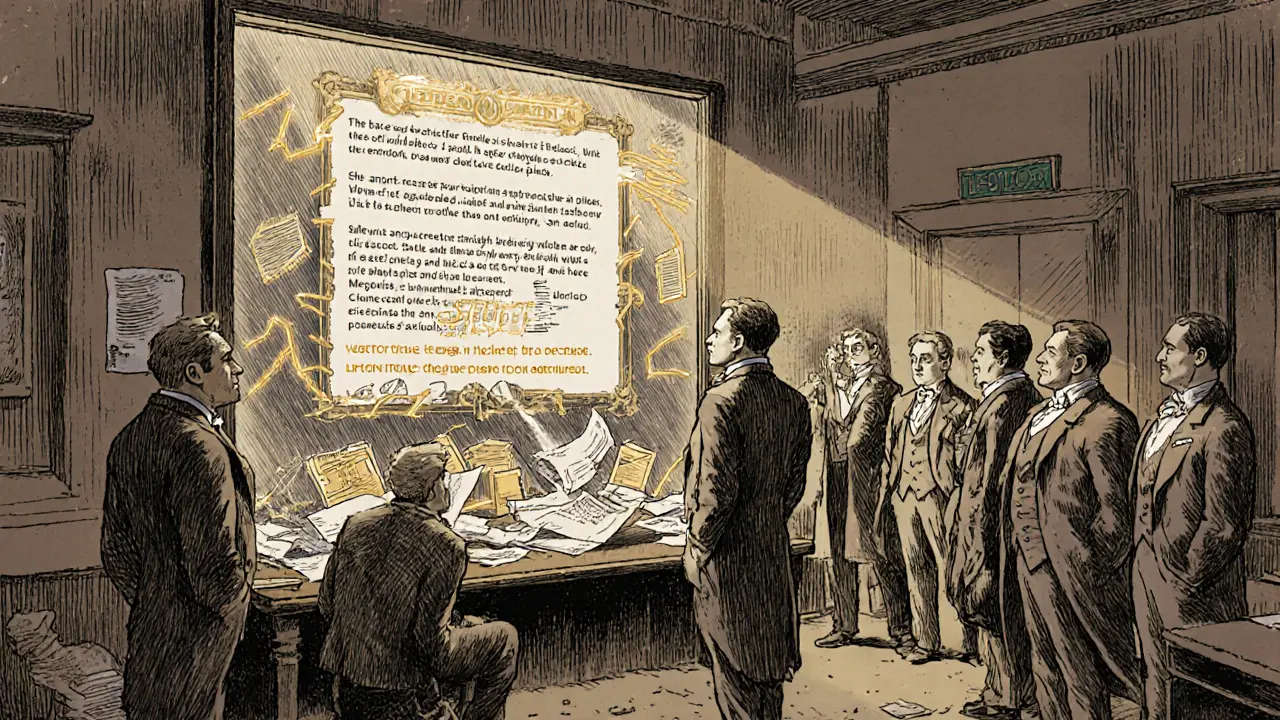Real Estate Transaction Speed Calculator
See how much blockchain technology can speed up your real estate transaction compared to traditional methods. Based on real-world data from Vermont, Sweden, and Austin.
Real estate transactions used to take weeks - now they can finish in days, or even hours
Think about the last time you bought or sold a home. Paperwork piled up. Title searches dragged on. Banks took days to confirm wire transfers. Escrow agents sat on documents. You waited. And waited. In most places, the whole process still takes 30 to 60 days. But what if you could cut that down to under a week? Or even 48 hours? That’s not science fiction. It’s happening - thanks to blockchain.
Why real estate transactions are so slow (and how blockchain fixes it)
Traditional home sales are like a relay race with 10 runners, each holding a different piece of the puzzle. One handles the title search. Another verifies the mortgage. A third manages escrow. Each step needs manual approval. Each person waits for the last. And every handoff adds days.
Blockchain removes the middlemen. Instead of paper files and emails, everything lives on a digital ledger - one that everyone involved can see, but no one can change. This is called an immutable distributed ledger. When a buyer and seller agree on a price, a smart contract kicks in. It’s code, not a lawyer. It checks: Is the buyer’s identity verified? Is the title clear? Are funds available? If yes, it releases the money and transfers ownership - automatically.
That’s the difference: 12 to 15 manual steps drop to just 3 or 4 automated ones. What used to take 72 hours to verify a title? Now it takes under 5 minutes. Wire transfers that took 3 to 5 banking days? Done in under an hour.
Real examples: How fast is it really?
It’s not just theory. In 2021, a property in Vermont sold through Propy’s blockchain platform in 72 hours. The state’s average? 35 days. In Sweden, the national land registry ran a blockchain pilot and cut title transfer times by 90%.
One buyer in Austin, Texas, closed a deal in 4 days on Propy - compared to the county’s typical 32-day wait. The buyer said: “The smart contract released the funds the second the title company confirmed the title was clean. No chasing banks. No waiting for wires.”
Commercial deals are moving faster too. JLL closed a $3.5 million property sale in 96 hours. Their innovation team said the biggest time saver? Eliminating manual wire verification - which alone used to cost 11 business days.

How blockchain actually works in a real estate deal
Here’s the step-by-step, without the jargon:
- Digital ID check - Both buyer and seller verify their identity using a secure blockchain wallet. No more photocopying passports. Done in under 24 hours (vs. 3-5 days traditionally).
- Smart contract triggers - Once both sides sign digitally, the contract runs automatically. It checks public records for liens, taxes, or ownership disputes. If everything’s clean, it moves to the next step. This used to take 7-10 days. Now it’s under 4 hours.
- Funds transfer and title change - Money moves from buyer to seller instantly via blockchain. At the same time, ownership updates on the ledger. No escrow holding funds. No bank delays. Done in under an hour.
That’s it. No title company calling for the 5th time. No lender asking for “one more document.” The system does it all.
Which blockchains are actually being used?
Not all blockchains are built the same. Most real estate platforms use either Ethereum or Bitcoin SV (BSV).
Ethereum confirms each block in 15-30 seconds. That’s fast enough for most transactions. But BSV? It can handle up to 50,000 transactions per second. That’s why some big commercial deals use BSV - speed matters when you’re moving millions.
Platforms like Propy, ShelterZoom, and Harbor are already live in the U.S., Canada, and parts of Europe. They don’t replace your realtor. They just make the paperwork vanish.
Where blockchain hits roadblocks
It’s not perfect. The biggest problem? Old systems won’t talk to new ones.
Many county recorder offices still require wet signatures on paper deeds. Even if your blockchain transaction is 100% complete, if the local office won’t accept digital records, you still have to print, sign, and mail. That kills 60-70% of the time savings.
As of 2023, 49 U.S. states recognize electronic signatures under the ESIGN Act. But 22 still demand physical documents for deeds. That means in those states, blockchain can’t deliver its full speed promise.
Another issue? Training. Real estate agents need to learn new tools. The National Association of Realtors found agents need 80-120 hours of training to use blockchain platforms confidently. That’s a big barrier for older professionals.

What’s next? The future is getting faster
Things are moving fast. Propy’s 2023 update cut average closing times to 58 hours. BSV Blockchain’s latest tech now settles compliant transactions in under 30 seconds.
The biggest game-changer coming? Central bank digital currencies (CBDCs). The Federal Reserve’s Project Hamilton showed that when blockchain meets CBDCs, a property transfer and payment can happen in under 15 seconds. No banks. No wires. Just instant ownership change.
By 2026, the Real Estate Standards Organization aims for universal 24-hour closings. By 2027, Deloitte estimates most blockchain-integrated deals will close in 24 to 48 hours - if regulators catch up.
Who benefits the most?
First-time buyers? They save weeks of stress. Investors? They can flip properties faster. International buyers? Cross-border deals that used to take 60-90 days now take 5-10. That’s huge.
Commercial real estate is leading the charge. Institutional investors managing $8.5 trillion in global property are already testing blockchain. Why? Because time = money. Waiting 30 days to close means lost rental income, delayed renovations, and missed opportunities.
The global blockchain real estate market is projected to hit $1.74 billion by 2028. And 78% of early adopters say speed was their main reason for switching.
Should you use blockchain to buy or sell?
If you’re in a state that accepts digital deeds - like Vermont, Arizona, or Illinois - and your agent is trained on a platform like Propy, then yes. It’s faster, cheaper, and more secure.
If you’re in a county that still demands paper, it’s worth asking your agent: “Can we try blockchain for the parts that work?” Even partial use cuts out days of waiting.
The tech is ready. The legal system is playing catch-up. But the trend is clear: real estate is moving from paper to pixels. And speed is winning.

Liam Workman
November 13, 2025 AT 15:58Louise Watson
November 14, 2025 AT 13:19Edward Phuakwatana
November 14, 2025 AT 15:28Suhail Kashmiri
November 14, 2025 AT 20:29Kristin LeGard
November 15, 2025 AT 19:44Arthur Coddington
November 16, 2025 AT 09:21FRANCIS JOHNSON
November 16, 2025 AT 19:46Ruby Gilmartin
November 17, 2025 AT 06:13Douglas Tofoli
November 18, 2025 AT 01:17William Moylan
November 19, 2025 AT 00:12Michael Faggard
November 19, 2025 AT 17:14Elizabeth Stavitzke
November 20, 2025 AT 11:28